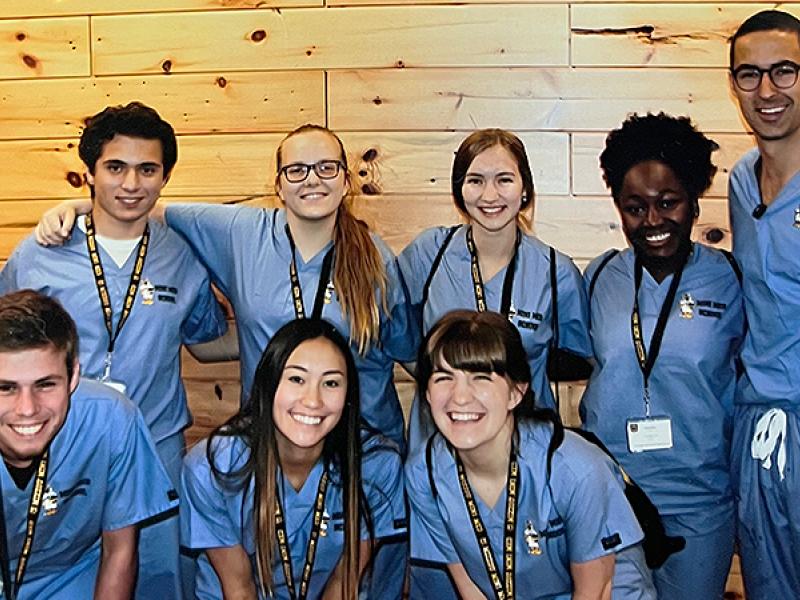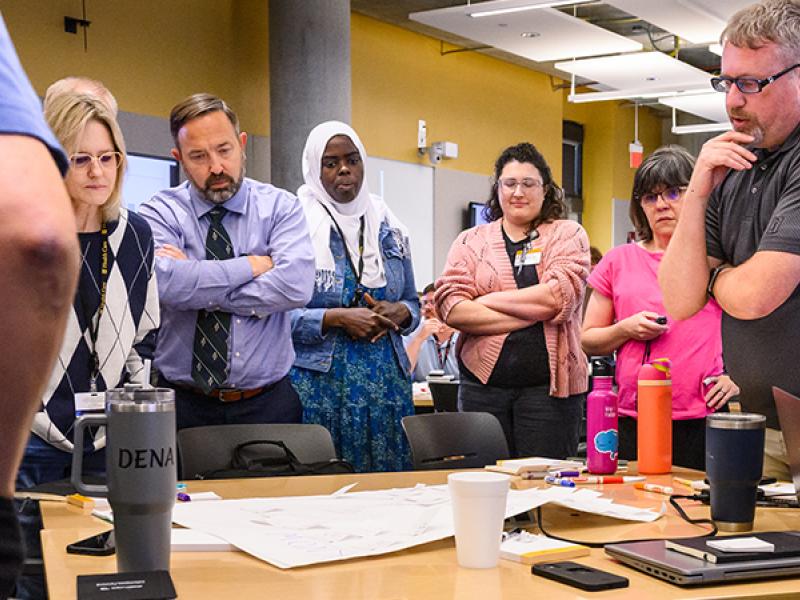The third and fourth years are the clinical phase of medical education. Read below for more information about each year.
M3 – Third Year
Year three builds on the skills and knowledge developed during the preclerkship blocks. In year three, the clerkship phase contains seven core clinical clerkships that offer you a range of experiences and opportunities to learn the fundamentals of good patient care. The clerkships are open to University of Missouri students only.
Clerkships must be supervised by an MU School of Medicine faculty member appointed through the School of Medicine. The faculty member will assess your competencies.
The School of Medicine is committed to exposing medical students to rural culture and health disparities through service learning, and the school aims to increase the number of physicians who choose to practice in rural Missouri. Through the Rural Scholars Program, third-year medical students may take up to four core clerkships at designated community-based educational centers throughout the state.
Learn more about the seven core clerkships.
M4 – Fourth Year
During year four, students and their advisers develop a program that reflects their career goals, individual strengths, and educational needs. Students will expand their breadth of medical knowledge and skills needed to be well-versed in many fields of medicine as well as focus on the specialties that most capture their interest, establish patterns of independence and initiative for lifelong learning, and demonstrate the medical knowledge and clinical skills necessary to enter graduate medical training programs.
The curriculum consists of three four-week advanced clinical selectives, or sub-internships; four four-week general electives; and one four-week Advanced Biomedical Sciences course. A minimum of four fourth-year courses (including one advanced selective) must be taken under the supervision of an MU School of Medicine faculty member.
Read more about the curriculum below and visit the Clinical Rotation Catalog for available courses.
Advanced Clinical Selectives
Three four-week advanced clinical selectives from the core disciplines are required. These core disciplines are family medicine, internal medicine, neurology, obstetrics and gynecology, pediatrics, psychiatry, and surgery. One must be in a surgical area, and one must be in a medical area, and the third can be in either the surgical or medical area. Advanced clinical selectives build on the knowledge and skills acquired during third-year core clerkships. Students are expected to assume more responsibility for patient care in the selectives than in the clerkships.
General Electives
Sixteen weeks of general electives are required. Several fourth-year electives are also available at our rural sites through the Rural Elective Program and at our Springfield Clinical Campus and count as on-site courses. Off-site experiences are available but must be approved by the appropriate department.
Contact the Springfield Clinical Campus
Advanced Biomedical Science Course
This four-week course revisits the biomedical sciences in the context of a patient, disease, diagnosis, or problem. Several options are available. For example, students may:
- Search and analyze the literature, integrate and evaluate data, produce a paper or presentation
- Conduct original research with mentors from the basic or clinical sciences
- Function as co-facilitators for patient-based learning (PBL), write a PBL case or serve as an academic tutor
- Participate in a global or public health experience
Visit the Clinical Rotation Catalog for available courses.
Integrated residency
The integrated residency program allows students to complete fourth-year rotations while also learning more about residency responsibilities in the specified program, providing additional focus to outstanding medical students in the field of medicine they wish to enter.
The program does not shorten the duration of training and is not an acceptance into a residency program. Read here for more.
Frequently asked questions
How do I enroll for rotations?
All rotations must be enrolled through the department student coordinator and the Office of Medical Education (LC 338) two weeks prior to the first day of the block (four weeks for all tutoring and two-week elective courses). For most courses, you will add/drop through the online enrollment/registration system (accessible via your student home page). For courses not available online, you will enroll using add/drop forms and offsite agreement forms (when applicable). Add/drop forms are available online through the M3-M4 page on Canvas and must be approved by your advisor, the student coordinator, and the Office of Medical Education before enrollment is accepted.
How and when can I drop a rotation?
Each rotation has a limited number of positions in each block, and work needs to be done to add or remove or change a student assignment. If you no longer want to be enrolled in a rotation, please drop it as soon as possible. This is needed in part to give all classmates fair opportunity to have registered for any rotation, and in part to allow for departments and other individuals to plan and do work needed for registration changes. For these reasons, except under unusual circumstances, and only with approval by a formal process, a student may not otherwise drop any required or elective rotation within four weeks of the start of the block.
How do I find research rotations?
Most basic science and clinical departments offer research rotations. Many of these opportunities are in the clinical rotation catalog. You may also contact departments directly to learn of other research projects that might be of interest to you.
How do I request an off-campus rotations?
You may request permission to receive credit for an off-site fourth-year clinical rotation by submitting an offsite agreement (available in the M4 Registration Guide) at least two weeks before the start of the rotation and a course description with goals and objectives from the host institution to the appropriate department.
Who must approve an off-campus rotation request?
Requests for off-site fourth-year rotations for credit must be approved by: your advisor, who attests that the program offers a distinctly valuable experience; the appropriate University of Missouri course director(through the student coordinator), who must attest to the quality of the program and its advantages; and the associate dean for curriculum and evaluation, who assures that the student is in good academic standing. Only fourth-year rotations taken at MU will be used in honors graduation computation.
Can I receive remuneration and credit for the same rotation?
Students may not receive both remuneration and credit for the same clinical rotation, except under the following circumstances: a research rotation, either at MU or elsewhere; a clinical rotation elsewhere for which a stipend is given for living and travel expenses; or rotations in the armed services.





